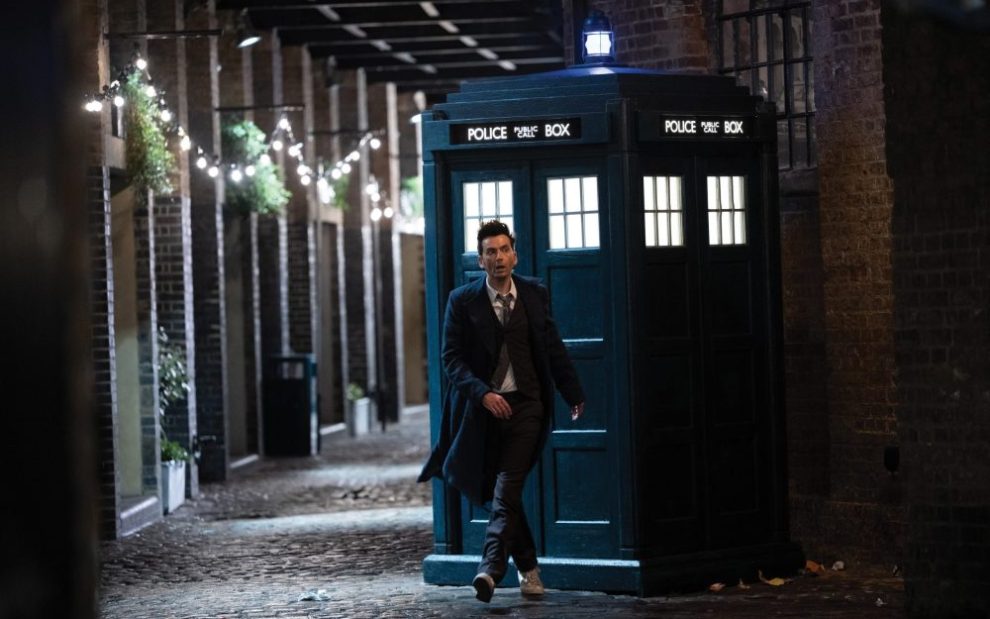The popular British science fiction series Doctor Who has just celebrated a momentous landmark: 60 years of broadcasting. What started as a modest time-travel story on black-and-white televisions in 1960s Britain has become a global phenomenon, recently partnering with Disney for its widest audience yet. This spring, for the first time, the Doctor will race off on exciting new adventures as a Black man, played by the Rwandan Scottish actor Ncuti Gatwa.
Over the years, fans have flocked to see this beguiling alien Time Lord travel with an assortment of companions through time and space in his iconic blue time machine, righting whatever wrongs they can. If this series focused simply on time travel and aliens, however, it would have likely ended years ago—but, as with all the best science fiction, Doctor Who has utilized the genre to explore cultural values and assumptions. Its stories allow audiences to consider alternative perspectives, unmask biases, and possibly redress prejudices, perhaps none more timely than issues of race and gender. For Catholic audiences, these explorations not only touch upon social justice teachings related to the dignity of life, but they also shed light on an embodied, incarnational faith that has long fought against elevating mind and spirit to the detriment of the body.
With nearly 900 Doctor Who episodes thus far, remarkable plotlines abound relating to race and gender. Episodes such as “Rosa” (2018) have the Doctor arrive in Alabama on the eve of Rosa Parks’ nation-altering refusal to move to the back of the bus. Here, the Doctor and his companions are thrust into firsthand experiences of racism in the 1950s. Since one companion is Black and another Pakistani, they are shocked by the horrendous, ever-present reality of racism. The episode triggers not only conversations about the painful persistence of racism in contemporary society but also a strengthened conviction to stand up against racial oppression. In a world where segments of society still downplay, deny, or outright perpetuate racial prejudices, episodes such as these artfully educate new generations about important historical figures and the evils of hatred based on race and gender.
Drawing from scripture, Christianity begins with a belief in the fundamental goodness of all things, including humanity. Genesis conveys the theological truth that God made and acknowledged that all things are “good”; at the same time, however, Christianity takes seriously the subsequent reality of sin and evil. Doctor Who, not a show to shy away from ugly truths, also offers lessons about the devastating consequences of evil, particularly racism.
The Doctor’s most famous foes, the Daleks, are the epitome of racial hatred and violence. While the Doctor seeks to nurture peace, mutual understanding, and reconciliation, believing in the possibility of goodness, the Daleks see all other species as not only inferior but repulsive; they want to exterminate any species that is not “pure” Dalek. The historical corollaries are chilling and disturbingly prescient. Rarely is the Doctor as infuriated as when trying to reason with the Daleks about the value of all life—and rarely is the Doctor as frightened as when he is confronted by the Daleks’ single-minded totalitarian power. Despite being defeated time and time again, the Daleks always resurface somewhere, a reminder to us all of the need for vigilance. Hatred, based upon anything that goes against the fundamental dignity of life, can emerge when least expected. Good people, following the Doctor’s example, must be willing to stand up against it.
From the outset, the Doctor has invited such good people to join in these journeys. These traveling companions are often the way audiences enter the story, as they see themselves represented on the screen. Such representation is an important element in social justice issues of race and gender. Over the years, people have delighted in seeing themselves in the Doctor’s companions as people who come from different cultures, socioeconomic backgrounds, races, and genders. The series’ writers brighten the spectrum with characters such as Black lesbian college student Bill Potts and beloved middle-aged, white, red-headed spitfire Donna Noble with her Black husband and their transgender child.
One of the most fascinating explorations of race and gender is reserved for the Doctor. Instead of dying, The Doctor has regenerated into a new body and personality numerous times, with differing ages, races, and genders, while retaining memories and values. With each regeneration, the Doctor must learn “who they are this time” and what it means to be embodied in this specific way.
The Doctor processes each regeneration with curiosity and gratefulness. In fact, after many regenerations as a man, the Doctor’s reaction to regenerating as a woman elicited one word: “Brilliant!” This also forced audiences to reevaluate their use of pronouns, as “she” and “they” seemed now equally true of the Doctor. Each regeneration provides valuable learning experiences, making the Doctor more understanding and empathetic for every new encounter. Introspective Christians may then wonder: How did Jesus feel being incarnated in a unique gender, race, space, and time?
The Doctor, this most beloved alien, helps humanize the experiences of people our society tends to other. Imagine belonging to the LGBTQ community as you watch the Doctor “transition” into a new body and navigate the world. Or observe the Doctor after a regeneration as they “come out” to someone they knew in a previous incarnation, vulnerably wondering if they will be accepted. An emotional episode depicts such a transition when the 11th Doctor regenerates from a young man into an old man—and his young female companion initially rejects him because he doesn’t fit her expectations. Anyone who has risked sharing with a friend or loved one their true gender or identity likely watched with empathetic tears, knowing all too well this fear of possible rejection.
Theologians have long grappled with the importance of embodiment and being fully integrated in mind and body. The Doctor opposes any form of disembodiment that reduces a being to mind or spirit alone. When the evil Time Lord Rassilon was intent upon guiding his people to cast aside their bodies in favor of “pure consciousness,” the Doctor sacrificed everything to preserve the full “personhood” of all beings.
Such deep explorations of the fundamental nature of life and the universe are more the stuff of metaphysics and theology than a popular science fiction series. But Doctor Who defies expectations with its life-affirming and delightful explorations in race and gender. And we haven’t even touched on shape-shifting Zygons!
This article also appears in the April 2024 issue of U.S. Catholic (Vol. 89, No. 4, pages 36-37). Click here to subscribe to the magazine.
Image: Disney+













Add comment